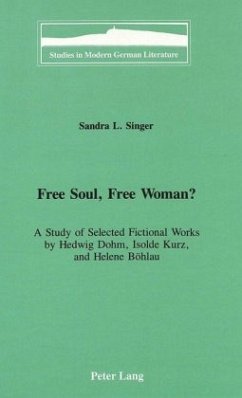In their lifetime, Hedwig Dohm (1831-1919) and Helene Böhlau (1856-1940) earned the praise of women's rights activists such as Minna Cauer and Helene Stöcker for their contributions to modern women's literature. Dohm engaged in debates on the women's movement with Lou Andreas-Salomé, Ellen Key, and Laura Marholm. Böhlau shocked the reading public with her novel Halbtier¿ , in which a woman triumphs after killing an abusive man. On the other hand, Isolde Kurz (1853-1944), who distanced herself from the women's movement, seems the odd woman out. Yet boundaries among these writers are more fluid than expected, especially in their portrayals of sexuality and spirituality.
"The book provides a provocative analysis of the renegotiations of gender identity and the capacity for agency and resistance in literary texts by German women at the turn of the last century. With a keen sense of the relation between historical context and personal lives, Singer explores ambiguous contradictions as well as clear emancipatory tendencies. She establishes intriguing links to contemporary debates within feminist literary criticism." (Nancy Kaiser, University of Wisconsin-Madison)
"Feminist scholars will welcome Sandra Singer's perceptive and useful study of ambiguity in the writings of these nineteenth-century German women writers. Her book is an important contribution to the growing field of American Germanist/feminist scholarship." (Ruth-Ellen B. Joeres, University of Minnesota)
"Feminist scholars will welcome Sandra Singer's perceptive and useful study of ambiguity in the writings of these nineteenth-century German women writers. Her book is an important contribution to the growing field of American Germanist/feminist scholarship." (Ruth-Ellen B. Joeres, University of Minnesota)

